Meagan N. Houston – Suicide & Non-Suicidal Self Injury: New Directions for the Treatment of Suicidal and NSSI Behaviors
$219.99 Original price was: $219.99.$43.00Current price is: $43.00.
Instant Download: You will receive a download link via your order email immediately
Should you have any questions, please contact us: [email protected]
-
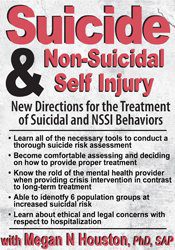 Meagan N. Houston – Suicide & Non-Suicidal Self Injury: New Directions for the Treatment of Suicidal and NSSI Behaviors
Meagan N. Houston – Suicide & Non-Suicidal Self Injury: New Directions for the Treatment of Suicidal and NSSI Behaviors - Faculty:
- Meagan N. Houston
- Duration:
- 6 Hours 17 Minutes
- Format:
- Audio and Video
- Copyright:
- Sep 22, 2015
Description
This recording goes beyond book knowledge of suicide. It’s full of candid, innovative and front line approaches to assessing and providing treatment to clients who present with suicidal and self-destructive behaviors. Practitioners will not only learn how to assess and treat suicidal patients, but will also be provided clinical tools to develop a suicide risk assessment that protects the clinician both ethically and legally.
Drawing from her years of experience across various populations and treatment settings, Dr. Meagan Houston will provide proven skills in conducting thorough suicide risk assessments, post-suicide risk assessments, and treatment plans with clients who present with suicidal potential. Candid discussion of case studies and use of video clips will also be featured. You will end the recording with:
- All the tools necessary to conduct a thorough and “legally sound” suicide risk assessment
- A comfort level with your assessment and decision on how to provide treatment
- Strategies for the mental health provider when providing crisis intervention in contrast to long-term treatment
- An ability to identify six population groups at increased suicidal risk
- Ethical and legal concerns with respect to hospitalization and treating suicidal patients
This recording is beneficial to both the seasoned and fledgling mental health practitioner as it answers questions that have not been provided previously and that most clinicians struggle with. Dr. Houston brings her knowledge, passion, experience, and drive to an issue that most clinicians will encounter at some stage in their career.
Handouts
| Manual – Suicide & Para-Suicide (3.6 MB) | 79 Pages | Available after Purchase | |
| Extra Handout – Suicide & Para-Suicide (282.4 KB) | 2 Pages | Available after Purchase |
Outline
IDENTIFY CLIENTS AT RISK
DSM-5® Diagnosis
- Schizophrenia Spectrum and other psychotic disorders
- Bipolar and related disorders
- Depressive disorders
- Anxiety disorders
- Obsessive-Compulsive and related disorders
- Trauma and stressor related disorders
- Dissociative disorders
- Feeding and eating disorders
- Substance-related and addictive disorders
- Personality disorders
Risks in Special Population Groups
- Military
- Geriatric
- Adolescents
- College students
- LGBT
- Prison
Recognize and identify the Dangers of Self-Destructive Behavior
- Emotion dysregulation
- Unhealthy coping skills
- Rehearsal
- Preparation
- Desensitization
- Attention-seeking behaviors
ASSESSMENT OF SUICIDAL CLIENTS
Conducting a thorough Suicide Risk Assessment
- 10 essential components
- Chronic and acute risk factors
- Distinguishing morbid ideation vs. suicidal ideation
- Imminent/chronic suicide risk
- Self-care and consultation
When to Hospitalize
- Ethical, legal implications and case studies
- Confidentiality
- Negligence
- Minor clients
- Informed consent and state-specific laws
- Voluntary vs. involuntary commitment
- When and how to use law enforcement
- Homicidal ideation
“Post-Suicide” Risk Assessment
- Changing clinical factors
- Remaining risk factors
- Follow-up recommendations
INTERVENTION AND TREATMENT
Self-Destructive Behavior Treatment Strategies
- Dialectical Behavior Therapy
- Communication
- Case management
Suicidal Behavior Treatment Strategies
- Integrate the four key elements of crisis intervention into treatment
- Cognitive Behavioral Therapy
- Other treatment interventions
- Psychopharmalogical intervention and management
- Recognize when patient returns to “status quo”
Consultation and Technology
- Tele-Therapy & the NEW APA Guidelines
- Social media implications
Faculty
Meagan N. Houston, Ph.D., SAP
Meagan N. Houston, Ph.D., SAP, has specialized in providing suicide treatment in a wide variety of settings and populations for over a decade. She has experience in high-risk settings where the application of suicide prevention, assessment, and intervention occurs daily. Dr. Houston treats clients who present with a variety of psychological and behavioral disorders – which lend themselves to acute and chronic suicidality. She emphasizes the use of empirically-based approaches when conducting suicide risk assessments. She has also provided her expertise in the area of treating suicidal clients and self-harm behaviors, as the published author of Treating Suicidal Clients and Self-Harm Behaviors: Assessments, Worksheets & Guides for Interventions and Long-Term Care (PESI, 2017).
Dr. Houston is employed full time with the Houston Police Department Psychological Services Division, and maintains a part-time private practice in Houston, Texas. She has also worked in the federal prison system. In addition, Dr. Houston has provided psychological, psychoeducational, and chemical dependency programs at private practices and college counseling centers. She has also provided geropsychological services to nursing homes and rehabilitation facilities.
Speaker Disclosures:
Financial: Meagan Houston is in private practice. She receives a speaking honorarium from PESI, Inc.
Non-financial: Meagan Houston has no relevant non-financial relationship to disclose.
Proof Content
Delivery Method
– After your purchase, you’ll see a View your orders link which goes to the Downloads page. Here, you can download all the files associated with your order.
– Downloads are available once your payment is confirmed, we’ll also send you a download notification email separate from any transaction notification emails you receive from IMC.sale.
– Since it is a digital copy, our suggestion is to download and save it to your hard drive. In case the link is broken for any reason, please contact us and we will resend the new download link.
– If you cannot find the download link, please don’t worry about that. We will update and notify you as soon as possible at 8:00 AM – 8:00 PM (UTC+8).
Thank You For Shopping With Us!
Be the first to review “Meagan N. Houston – Suicide & Non-Suicidal Self Injury: New Directions for the Treatment of Suicidal and NSSI Behaviors” Cancel reply
Related Products
Medical & Health

![[Audio Download] CC16 Topical Panel 03 - Attachment - Rick Miller](https://imc.sale/wp-content/uploads/2022/02/Audio-Only-CC16-Topical-Panel-03-Attachment-Rick-Miller-LICSW-Diane-Heller-Scott-Woolley-PhD-100x100.png)

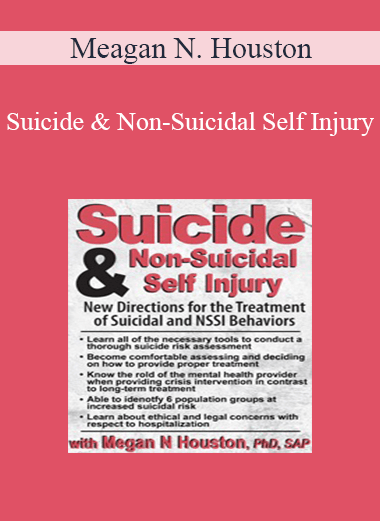

![[Download Now] Suicidal Clients and Self-Harm Behaviors: Clinical Strategies to Confidently Address Two of the Most Daunting (and Potentially Lethal) Scenarios You’ll Work With – Meagan N Houston](https://imc.sale/wp-content/uploads/2022/02/Suicidal-Clients-and-Self-Harm-Behaviors-Clinical-Strategies-to-Confidently-Address-Two-of-the-Most-Daunting-and-Potentially-Lethal-Scenarios-Youll-Work-With-–-Meagan-N-Houston.jpg)
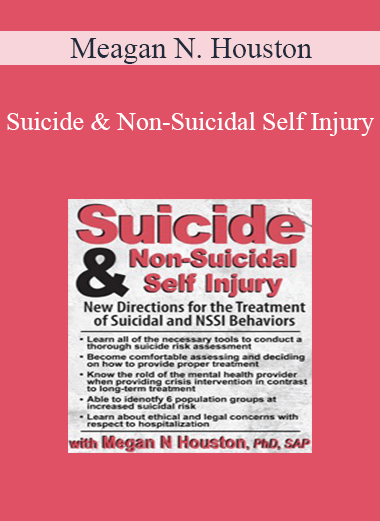
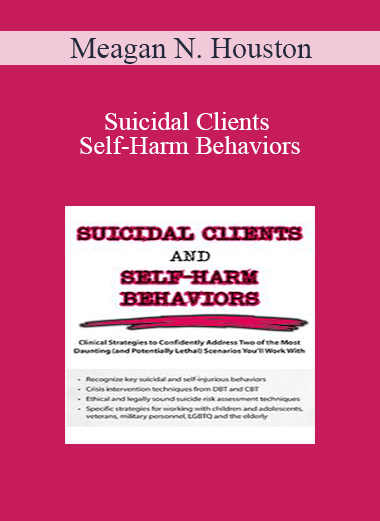
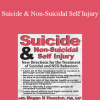
10 reviews for Meagan N. Houston – Suicide & Non-Suicidal Self Injury: New Directions for the Treatment of Suicidal and NSSI Behaviors
There are no reviews yet.